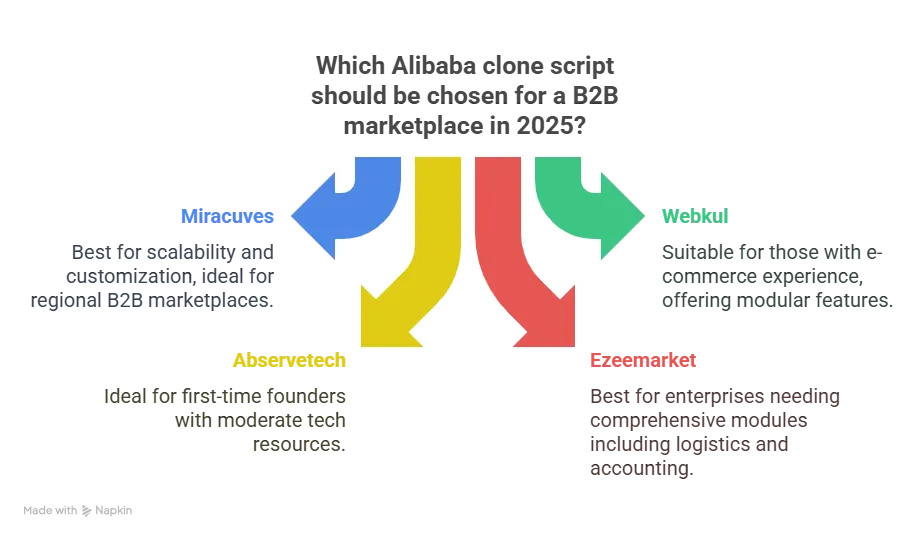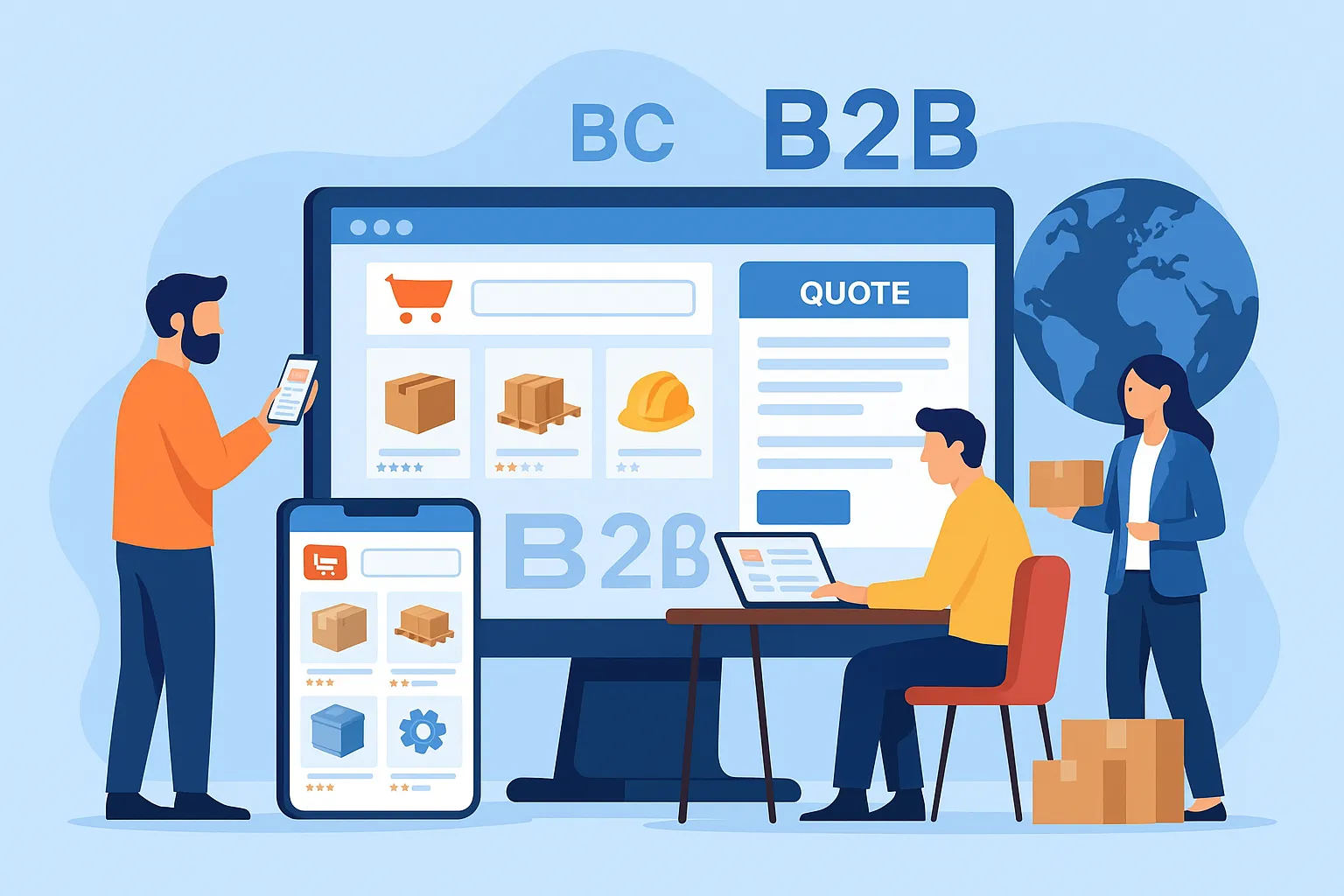B2B e-commerce isn’t flashy, but it’s where the real money is. While everyone chases after direct-to-consumer unicorns, platforms like Alibaba have quietly dominated wholesale and cross-border trade — connecting factories, suppliers, retailers, and buyers across the globe. In 2025, the B2B marketplace is booming, with local entrepreneurs and SaaS founders scrambling to build platforms that cater to niche industries, regional markets, or private networks.
Building a full-fledged B2B marketplace from scratch can be overwhelming. You’re dealing with complex product categories, RFQs (requests for quotation), logistics, payments, and trust-building — all rolled into one. That’s where Alibaba clone scripts come in. They take the heavy lifting off your plate so you can focus on branding, onboarding suppliers, and going to market quickly.
If you’re planning to launch a B2B wholesale marketplace, this guide unpacks the best Alibaba clone scripts in 2025. We’ll walk through the must-have features, pricing breakdowns, and strategic insights so you can hit the ground running.
Why Build an Alibaba Clone in 2025?
The Rise of Niche B2B Marketplaces
While Alibaba and IndiaMART dominate the global scene, the real opportunity lies in vertical-specific platforms — think industrial tools, farming equipment, ethnic textiles, or even private-label cosmetics. Buyers want relevance, transparency, and trusted sellers in their own supply chains.
SMEs Are Going Digital (Fast)
Small and medium-sized businesses are tired of dealing with spreadsheets and slow vendor processes. They want one-click catalogs, bulk pricing, and secure communication. B2B marketplaces solve these pain points and create massive long-term value.
COVID Changed Buyer Behavior Forever
Remote sourcing, digital negotiations, and online payments are the new norm. Buyers now expect e-commerce-style UX even in the B2B space — which means platforms with filters, product specs, certifications, and transparent reviews will win.
Read More : Reasons startup choose our Alibaba clone over custom development
What to Look for in a Modern Alibaba Clone Script
B2B marketplaces are very different from B2C e-commerce apps. They require more than just product listings and carts. Here are the key features that matter in 2025:
Product Catalogs
- Bulk product upload with CSV
- Detailed spec sheets, SKUs, and variants
- MOQ (Minimum Order Quantity) settings
- Tiered pricing and custom quotes
- Media-rich galleries (photos, certifications, videos)
Buyer-Seller Communication
- Built-in messaging system
- RFQ submission with response tracker
- Quotation management dashboard
- Multi-language support
Admin & Management Tools
- Seller verification and KYC
- Commission and subscription model options
- Tax configuration (VAT, GST)
- Analytics and user reports
- Dispute resolution system
Transaction & Payment Infrastructure
- Escrow or milestone payment support
- Bulk invoice generation
- Shipping management (third-party API integration)
- Multiple currency support
- Purchase order downloads
B2B buyers want clarity, compliance, and confidence. Your script should deliver all three — or you risk churn before you even launch.
Best Alibaba Clone Scripts in 2025

1. Miracuves Alibaba Clone
Overview: A robust, multi-vendor B2B marketplace script tailored for scalable wholesale trade. Built with deep customization options and enterprise-ready architecture.
Key Features:
- Product catalog with RFQ support
- Verified seller onboarding with document upload
- Built-in messaging and order negotiation
- Bulk orders, pricing slabs, and tiered discounts
- Escrow payment integration
Best For: Founders targeting regional, vertical-specific B2B marketplaces
Pros: Built to scale, clean backend, highly customizable, mobile-responsive
Cons: Requires strong supplier acquisition strategy to get started
2. Webkul B2B Marketplace Script
Overview: Extension-based solution built on Magento, WooCommerce, or Shopify. Offers modular features and a developer-friendly structure.
Key Features:
- Customer-to-vendor RFQ module
- Lead tracking system
- Quote approval workflows
- Tiered pricing rules
Best For: Teams with e-commerce experience wanting to expand into B2B
Pros: Rich in B2B features, built on trusted CMS platforms
Cons: Add-ons can quickly push up the total cost
3. Abservetech Alibaba Clone
Overview: Traditional Laravel-based script designed for wholesale trade platforms. Covers key buyer-seller flows.
Key Features:
- Seller storefronts
- Inquiry messaging
- Advanced product filtering
- Admin commission settings
Best For: First-time founders with moderate tech resources
Pros: Simple setup, responsive design, good documentation
Cons: Limited scalability without custom development
4. Ezeemarket B2B Script
Overview: All-in-one B2B clone script with marketplace, logistics, and accounting modules included.
Key Features:
- Purchase requisition management
- Export-import documentation tools
- Escrow payments and document verification
- Custom report builder
Best For: Enterprises and digital agencies building for large clients
Pros: Feature-rich and localized options
Cons: Higher upfront investment
Read More : Alibaba Features Explained: A Guide for Startup Founders
Cost Factors & Pricing Breakdown
Alibaba-Like B2B Wholesale Marketplace Development — Market Price
| Development Level | Inclusions | Estimated Market Price (USD) |
|---|---|---|
| 1. Basic B2B Marketplace MVP | Supplier & buyer registration, product listings, categories, search & filters, inquiry/quote system, basic messaging, and a simple admin panel. | $50,000 |
| 2. Mid-Level B2B Trading Platform | Web + mobile UI/UX, supplier storefronts, RFQ management, bulk pricing, reviews & ratings, notifications, multiple payment options, and analytics dashboards. | $120,000 |
| 3. Advanced Alibaba-Level Platform | Verified suppliers, trade assurance workflows, multi-language & multi-currency support, escrow-style payments, logistics integrations, subscription plans, and enterprise-grade scalability. | $240,000+ |
These figures represent typical global development costs for building a large-scale B2B wholesale marketplace like Alibaba — covering supplier verification, bulk trading workflows, and cross-border commerce.
Miracuves Pricing for an Alibaba-Like Platform
Miracuves Price: Starts at $2,899
This includes a complete B2B marketplace solution with buyer–supplier onboarding, product catalog management, RFQ & inquiry system, messaging, pricing controls, payment setup, and a powerful admin backend — fully customizable and ready for launch.
Note:
Includes full non-encrypted source code, backend setup, admin configuration, UI integration, API connections, and deployment assistance — enabling you to operate an Alibaba-style wholesale marketplace under your own brand.
Launch Your Alibaba-Style B2B Marketplace — Contact Us Today
Delivery Timeline for an Alibaba-Like Platform with Miracuves
A typical delivery timeline is 3–9 days, depending on:
- Number of supplier categories & products
- RFQ, bulk pricing & negotiation workflows
- Branding & UI/UX customization
- Localization (languages, currencies, trade rules)
- Payment gateway & logistics integrations
- Additional verification or compliance modules
Tech Stack
Developed using PHP, optimized for high-volume catalogs, secure buyer–supplier interactions, scalable supplier onboarding, and reliable performance for global B2B marketplaces.
Monetization Models That Work for B2B Marketplaces
B2B buyers and sellers have different expectations than retail users. Here are proven ways to monetize a B2B platform:
1. Seller Subscription Plans
Offer monthly or annual plans for sellers to list products, access RFQs, or get analytics dashboards. Great for predictable revenue.
2. Transaction-Based Commissions
Take a percentage fee on each successful deal — either flat or tiered based on volume or order value.
3. Lead-Based Pricing
Charge sellers per qualified lead or quote request. Works well in niche, high-ticket industries.
4. Premium Listings & Ads
Offer homepage placement, “trusted seller” badges, or promoted listings in search for a fee.
5. Private Label Tools
Sell value-added services like branded storefronts, catalog management, and white-labeled mobile apps to large vendors or associations.
Challenges to Be Ready For
B2B marketplaces are lucrative — but not easy. Before you jump in, make sure you’re aware of the hurdles most new founders face:
- Trust Building: B2B buyers want guarantees, documentation, and third-party verification. Make this part of your onboarding process.
- Onboarding Sellers: Factories and distributors may not be tech-savvy. Your platform must make it dead simple to list products, manage orders, and respond to quotes.
- Product Complexity: Unlike B2C, B2B products can be highly technical. Your product pages need to accommodate spec sheets, datasheets, and variants.
- Cross-Border Issues: If you plan to go international, be ready for customs, logistics APIs, multi-currency support, and regulatory constraints.
- Cold Start Problem: B2B is a two-sided market. You need enough buyers to attract sellers and vice versa. Solving this chicken-and-egg problem requires focused initial marketing.
Read More : Business Model of Alibaba : Revenue Streams & Strategy
Conclusion
The B2B e-commerce space is ripe for disruption. Whether you’re building a local marketplace for artisan producers or a global trading hub for industrial parts, starting with the right Alibaba clone script can dramatically reduce your time-to-market and technical debt. Focus on the core flows — quoting, negotiation, trust-building, and compliance — and you’ll be set up for a powerful launch.
At Miracuves, we help innovators launch high-performance app clones that are fast, scalable, and monetization-ready. Ready to turn your idea into reality? Let’s build together.
FAQs
Still have questions about launching an Alibaba clone? Let’s clear them up.
Can I use these scripts to build a niche B2B platform?
Yes. Most clone scripts are customizable and allow you to target specific industries or geographies.
Is it legal to clone Alibaba’s features?
Yes — as long as you’re not copying the brand or trademarks. Clone scripts offer similar functionality, not intellectual property.
How long does it take to launch?
With a ready-made script, you can go live in as little as 3-9 days , depending on customization and branding needs.
Can I offer multi-currency support?
Absolutely. Leading scripts include currency configuration and localization tools out of the box.
What kind of suppliers should I target first?
Start with verified local manufacturers or wholesalers in one region or industry. Build trust and scale from there.
Is escrow mandatory?
Not mandatory, but highly recommended. Escrow systems reduce fraud and build buyer confidence — especially for large transactions.
Related Articles








